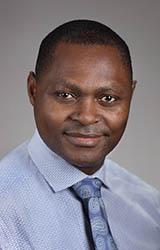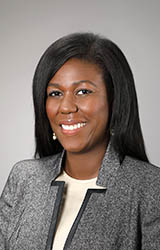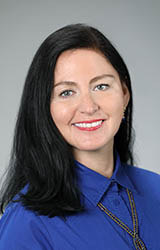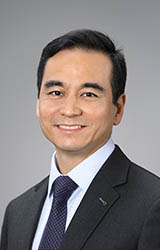Five New Lasker Scholars
Part of the Next Generation of Clinical Researchers
Congratulations to the five investigators who recently joined the ranks of the Lasker Clinical Research Scholars Program, NIH’s collaborative effort with the Albert and Mary Lasker Foundation to nurture the next generation of clinical researchers: Sean Agbor-Enoh, who’s developing methods for early detection of and treatment for lung-transplant rejection; Paule V. Joseph, who’s investigating how taste and smell are involved in metabolic disorders and substance-use disorders; Joanna Klubo-Gwiezdzinska, who is searching for optimal ways to diagnose and treat thyroid nodules and thyroid cancer; Nirali N. Shah, who is testing novel immunotherapeutic approaches to treat blood cancers in children, teens, and young adults; and David Takeda, whose research focuses on treatment-resistant prostate cancer.
The Lasker Clinical Research Scholars Program, which began in 2011, is an “intramural–extramural” endeavor that funds a small number of exceptional clinical researchers in the early stages of their careers to help them achieve independence. Lasker Scholars receive a unique combination of NIH funding for clinical research for up to 10 years.
In the first phase of the program, scholars receive appointments for five to seven years as tenure-track investigators, with independent budgets, within the NIH Intramural Research Program. In the second phase, successful scholars either remain as tenure-track investigators in the intramural program, or receive up to three years of NIH support for their research at an extramural research facility. The program’s first two scholars (in 2012)—Nehal Mehta (National Heart, Blood, and Lung Institute) and Jessica Gill (National Institute of Nursing Research)—chose to remain at NIH and have been tenured.
Lasker Scholars have access to the NIH Clinical Center, the nation’s largest hospital devoted entirely to clinical research. In addition, through an arrangement with the Lasker Foundation, scholars have the opportunity to participate in selected activities, including attendance at the Lasker Breakfast and Award Luncheon and participation in annual scientific meetings.
Read more about the people who became Lasker Scholars in 2019.
Sean Agbor-Enoh, M.D., Ph.D.
Lasker Clinical Research Scholar, Laboratory of Applied Precision Omics, National Heart, Lung, and Blood Institute

Website: https://www.nhlbi.nih.gov/science/applied-precision-omics/people/agbor-sean
Sean Agbor-Enoh is developing genomic methods for the early detection and treatment of lung-transplant rejection. His method—which can detect rejection two to three months earlier than the current invasive process of taking a lung-tissue biopsy after rejection has begun—involves a simple blood test that measures cell-free DNA in the bloodstream. “My hope is to bring innovative and cutting-edge approaches to improve survival after lung transplantation,” he said.
Growing up in Cameroon (Central Africa), in the shadow of the Mount Cameroon volcano, Agbor-Enoh was treated to amazing sunrise views when he returned from early-morning fishing trips. He wondered how the interaction of the sun’s rays with the volcanic rocks created those views. “That’s what got me interested in asking the question ‘Why?’” And these days he’s asking “Why” in connection with lung-transplant patients—why are transplanted lungs more likely to be rejected than other transplanted organs?
Agbor-Enoh received his M.D. from the University of Yaoundé (Yaoundé, Cameroon) and a Ph.D. in molecular biology from Georgetown University (Washington, D.C.). He did a postdoctoral fellowship at Georgetown University Medical Center; a residency and chief residency in internal medicine at Johns Hopkins Bayview Medical Center (Baltimore); a fellowship in critical care medicine at the NIH Clinical Center; and a fellowship in pulmonary medicine at Johns Hopkins Hospital (Baltimore). Outside of work he loves to explore nature’s treasures with his wife and four children, who range in age from 2 to 17.
Paule V. Joseph, Ph.D., R.N., F.N.P., M.S.
Lasker Clinical Research Scholar and NIH Distinguished Scholar, Sensory Science and Metabolism Unit, Biobehavioral Branch, National Institute of Nursing Research; joint appointment at the National Institute on Alcohol Abuse and Alcoholism

Website: https://irp.nih.gov/pi/paule-joseph
Paule V. Joseph is conducting preclinical, clinical, and translational studies to improve the diagnosis, prevention, and management of chemosensory disorders and symptoms—in chronic conditions such as obesity and type 2 diabetes—by examining the role that smell and taste play in those conditions. She is also exploring how the neurological mechanisms underlying taste and smell might be different in individuals with alcohol and substance-use disorders. “The opportunities [at NIH]—especially as an underrepresented minority in science—are unparalleled,” she said. “For a junior scientist like me to be able to collaborate with people like Kevin Hall [a pioneer in metabolism research at the National Institute of Diabetes and Digestive and Kidney Diseases], Nora Volkow [director of the National Institute on Drug Abuse and world pioneer in neuroimaging in addiction], and Gary Gibbons [Director of the National Heart, Lung, and Blood Institute and world-renowned expert in cardiovascular disease], it’s a dream come true.”
Joseph has been interested in science since she was a schoolgirl in Venezuela. “From an early age, science became a tool that I use to understand the world around me,” she said. She learned from her father who spent weekends and holidays teaching chemistry, physics, and math to her and her sister; her mother who was a nurse and cared for sick patients; and “some amazing teachers who persuaded me to travel down the scientific path.” When she came to the United States to study nursing “I discovered…a niche that allows me to be myself without compromising my passion for science as well as my desire to help people in need,” she said. “As a nurse scientist, I am able to conduct research that improves the field of nursing and health outcomes for patients.”
After receiving her M.S. in a family nurse practitioner program from Pace University (New York) and a Ph.D. in nursing and genomics from the University of Pennsylvania (Philadelphia), Joseph did a postdoctoral fellowship in NINR. Outside of work, she enjoys spending time with her parents and her younger sister and doing humanitarian work around the world.
Joanna Klubo-Gwiezdzinska, M.D., Ph.D., M.H.Sc.
Lasker Clinical Research Scholar and Acting Section Chief, Thyroid Tumors and Functional Thyroid Disorders, Metabolic Diseases Branch, National Institute of Diabetes and Digestive and Kidney Diseases

Website: https://www.niddk.nih.gov/about-niddk/staff-directory/biography/klubo-gwiezdzinska-joanna
Joanna Klubo-Gwiezdzinska focuses on clinical and translational studies to find optimal options for the diagnosis and treatment of thyroid nodules and thyroid cancer. Her work includes identifying the genetic background of thyroid tumors, novel molecular targets for therapy of thyroid cancer, and a comprehensive analysis of cross-talk between cancer signaling pathways and metabolism. Her lab discovered that the antidiabetes drug metformin can slow the growth of thyroid tumors and other cancers that express high amounts of a certain protein in the mitochondria.
Klubo-Gwiezdzinska was a young girl, in 1986, when one of the worst nuclear disasters in history took place at the Chernobyl Nuclear Power Plant in northern Ukraine. As the radioactive contamination spread from the wreckage, some people died of radiation poisoning and others slowly developed thyroid cancer. Luckily she lived in a neighboring country, Poland, which implemented a prevention program that had children drinking a one-time dose of a cold iodine solution to block the absorption of radiation by the thyroid gland. “It looks like it worked because the incidence of [thyroid] cancer is lower than in other [neighboring] countries,” she said. The Chernobyl accident sparked her interest in endocrinology, especially in the study of the thyroid gland.
She received an M.H.Sc. from Duke University (Durham, North Carolina) and an M.D. and Ph.D. in endocrinology and thyroid cancer from Collegium Medicum, Nicolaus Copernicus University (Torun, Poland). She completed a residency in internal medicine and endocrinology at Nicolaus Copernicus University Hospital (Bydgoszcz, Poland); a postdoctoral fellowship in thyroid cancer at Georgetown University–Medstar Research Institute (Washington D.C.); a residency in internal medicine at Washington Hospital Center–Georgetown University (Washington, D.C.); and a clinical fellowship in endocrinology at the National Institute of Diabetes and Digestive and Kidney Diseases. Outside of work, she enjoys going to the opera in New York and the Kennedy Center in Washington, D.C.; spending family time with her husband and son, particularly walking their dog together; and reading inspiring biographies.
Nirali N. Shah, M.D., M.H.Sc.
Lasker Clinical Research Scholar, Pediatric Oncology Branch, Center for Cancer Research, National Cancer Institute

Website: https://irp.nih.gov/pi/nirali-shah
Nirali N. Shah is testing novel immunotherapeutic approaches to treat high-risk hematologic malignancies in children, adolescents, and young adults. Her research focuses on chimeric antigen receptor (CAR) T-cell-based strategies and other antibody-based therapies. She leads clinical trials to treat relapsed and refractory pediatric acute lymphoblastic leukemia; serves as an associate investigator on several transplant trials with patients who have primary immunodeficiency; and, in collaboration with investigators in the National Institute of Allergy and Infectious Diseases, is leading an effort on transplantation for children with DOCK8 immunodeficiency syndrome.
“For me, the patients are the inspiration for the work I do,” she said. Shah, whose father is an internal medicine physician in Chicago, said she has always been interested in medicine. At the age of 10, she was fundraising for St. Jude Children’s Research Hospital (Memphis, Tennessee). “That’s the first time I heard about pediatric oncology,” she said. “I was drawn to it.” And as an undergraduate at the University of Illinois (Chicago), she shadowed a pediatric hematologist-oncologist. “I just kept coming back to it.” In particular, she’s trying to understand the complexity of how the whole process of blood-cell formation “gets disrupted with leukemia.”
Shah received her M.H.Sc. in clinical research from Duke University (Durham, North Carolina)–National Institutes of Health and her M.D. from the University of Illinois, College of Medicine (Chicago). She did an internal medicine residency at Harvard Combined Internal Medicine–Pediatrics Residency Program (Boston); was a fellow in pediatric hematology-oncology at the joint National Cancer Institute–Johns Hopkins Hospital (Baltimore) training program; and served as clinical fellow and staff clinician in NCI’s Pediatric Oncology Branch. Outside of work, she is kept busy with three children ages 4 to 11—balancing work, homework, after-school activities, and “having a bossy baby who makes us all sing Frozen songs.”
David Takeda, M.D., Ph.D.
Lasker Clinical Research Scholar, Laboratory of Genitourinary Cancer Pathogenesis, Center for Cancer Research, National Cancer Institute

Website: https://irp.nih.gov/pi/david-takeda
David Takeda uses functional genomic approaches to advance the understanding of prostate cancer in order to provide new insights into potential therapies. He is interested in how prostate cancer becomes resistant to therapy. Using a combination of functional genome editing and epigenomic profiling, his lab recently described an enhancer of the androgen receptor that is activated and amplified in 80% of metastatic castration-resistant prostate cancers.
“For more than 20 years, it’s been known that these advanced prostate cancers [become] resistant to therapy [by amplifying] the androgen receptor (AR) gene,” said Takeda. While that’s true, “a lot of times what happens is that the amplification also takes a region of the non-coding genome.” So the cancers are not just affecting the gene itself, but the regulatory elements, too. Understanding the epigenetics (the way the genes are expressed and used) gives scientists “a more full picture of how these cancers are overcoming treatments.”
Takeda has always been interested in science and thinks of medicine as applied biology, he said. “Cancer [is] always interesting because it’s something that subverts biology. So you can learn something from that.”
He earned an M.M.Sc. in biomedical informatics, an M.D., and a Ph.D. in medicine and experimental pathology from Harvard Medical School (Boston). He did a residency in internal medicine at Brigham and Women’s Hospital (Boston) and a hematology-oncology fellowship at Dana-Farber Cancer Institute (Boston). NIH is “one of the few places where they encourage and support you to come do high-risk, high-impact projects,” he said. “I think being able to invest in something like that really attracted me and the fact that the [NIH Clinical Center] is entirely dedicated to research.” Outside activities include following Boston sports (when he lived in Boston); now he’s on the lookout for new hobbies.
To learn more about the Lasker Clinical Research Scholars Program, which honors the contributions of Mary and Albert Lasker to the NIH and to the overall biomedical community and the 23 other scholars who have been profiled in the past, go to https://www.nih.gov/research-training/lasker-clinical-research-scholars.
This page was last updated on Tuesday, March 29, 2022
